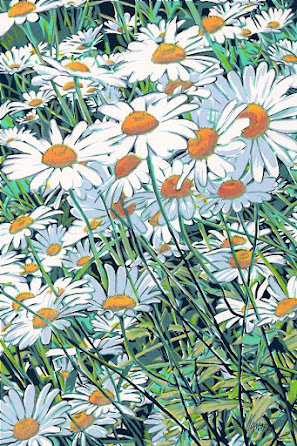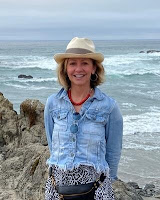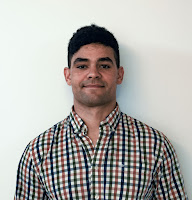Each week we will spotlight a different DPW artist who will give away one of their best paintings. To enter to win Roberts's painting "A Bend In The Road" go to Daily Paintworks and click on the link at the top of the page announcing their interview.
From Robert's DPW Gallery Page: For me, painting the world that I live in is a way to re-create it and possess it in a loving, sympathetic way. My approach to painting is to build up marks and brushstrokes that become an image which cannot avoid reflecting my emotional response to what I see. And hopefully this aggregation of paint positively affects the viewer as well, while it also resembles what I am looking at. My middle initial H is for “Henri”. So, amusingly, I’ve always been conscious of being Robert Henri Lafond. The painter Robert Henri wrote, "Your painting is the marking of your progression into nature, a sensation of something you see way beyond two pretty colors over there. Don't stop to paint the material, but push on to give the spirit."
I attended the Boston Museum School, and have an undergraduate degree in Art History (summa cum laude) from Princeton University where I studied under the abstract painter Esteban Vicente. I paint predominantly landscapes and cityscapes in oils and pastels, both in the studio and plein air, concentrating on the Berkshires and Brooklyn. Learn more and see more at my art blog: markandremark.blogspot.com.
 |
A Bend In The Road
(click to view)
Enter to win by clicking on the link at the top of the DPW home page announcing interview
|
What did you want to be growing up?
When I was ten or eleven, I remember dreaming of becoming an architect. My grandfather was an architect. I loved the work of Frank Lloyd Wright. Then in high school, I decided that I wanted to become a painter. My mother always encouraged my artistic bent. A painting of hers depicting Saint Cecilia hung over the piano. We had a book with reproductions of the Ashcan School around the house. I was aware from a young age that my middle name Henri, after my other grandfather, made me Robert Henri Lafond. I drew all the time and could catch likenesses easily, so everyone in my family thought I was going to be an artist.
When did your artistic journey begin?
I did a lot of drawing and painting in high school, and thought of going to the Boston Museum School. I grew up in New Hampshire. However, I got into Princeton University on a full scholarship, and went there for my freshman year. I dropped out during my second year. I ended up in Boston where I did attend the Museum School for a couple years. I was also involved in a Catholic Worker soup kitchen where I drew portraits of the men from the streets. Able to return to Princeton after almost three years away, I entered the Art History Program, graduating summa cum laude two years later. At this point I was painting abstractions. My senior thesis was a group of paintings. After graduation I started working full time at the Princeton University Art Museum as Registrar. I continued to paint abstractions. Because of my job, I visited galleries and museums in New York frequently during the heydays of the 70s and 80s, and also traveled to museums in Europe.
Did you have any long periods without creative expression? How did you get back on the horse?
My free time outside of work was devoted to painting color abstractions based upon placements and displacements of torn and cut paper. I showed in a variety of local exhibitions, and through a contact, had some paintings briefly in a New York gallery. Then I stopped painting for a long while. I focused upon other interests and changed careers, moving to Information Technology, after taking evening classes for a Masters degree in Information Systems. However, I kept drawing during this time. My drawings were representational, mainly landscapes and buildings.
I’ve never done anything half-hearted. So when I started painting again in earnest, I did it everyday. Why did I start again? Somehow I realized that I have only one life to live, and that painting had to be at the center of it. I’ve painted almost every day now for the last fourteen years. I recently saw a short film of an artist who has stopped working late in life. He regretted that he no longer had the passion to work at it every day. Where does the passion come from? I don’t know. But the passion for painting is necessary.
Which mediums and genres do you gravitate toward? Which ones don’t appeal?
When I started painting every day, I worked with pastels since they are a natural extension of drawing. I slowly started to work again in oils, but this time it was different since I wanted to paint outside as well as in the studio. Then and now I paint mostly landscapes. I like to paint portraits and figures also, but there are fewer opportunities to do so. I’ve always been motivated by my surroundings. I also started to do cityscapes in oil and pastels. Recently, I’ve started to do gouache paintings because I’m always looking for ways to paint quickly outside and on my travels.
What was the process like of pinpointing your personal style or finding your voice?
Since the time I started to paint every day, I’ve never thought about a style. I just work. It was when I was younger that I worried about a style. I think good painting is dependent upon one’s maturity and experience. My early paintings reflected the artists I admired at the time. I wanted to do my own work then, but I didn’t know what that was.
Name an artist (or artists), well-known or not, who you admire. Why?
When I was younger, I admired Richard Diebenkorn, Jasper Johns, and Willem de Kooning. I tried to paint like them. Today I admire a different group of artists. My favorites include painters like Charles Movalli, Bernard Dustin, Ken Howard, Edouard Vuillard, Albert Marquet, Isaac Levitan, Lois Dodd, Neil Welliver, people who are representational painters with a bend slightly towards abstraction. Another influential painter who perfectly combines painting and the Internet has been Julian Merrow Smith. A mainstay painter has always been Paul Cezanne. There are a lot of wonderful painters today from Russia and England who post their work frequently. I’ve maintained a blog since 2008 and utilize Facebook and Instagram to promote my work. I also sell my work on Etsy and Daily Paintworks. Through the Internet, I’ve met and know of many contemporary artists.
If you could offer one piece of advice to your younger, creative self — what would that be?
I’ve often thought that you can’t be where you are now without having gone through what you have gone through. I probably wouldn’t have listened to me back then anyway. I did have to make a living, so there are limits to what one can do if you want to be an artist. My advice to other artists, who might ask me for advice, is to draw. Without being able to draw, you don’t learn to see or paint as well as you could.
Do you utilize any habits or tricks for winning the distraction and procrastination battle?
If I come to a moment when I don’t know what to do next, I draw. It always leads to something. I may go walking with a sketchpad in hand. Or I start a painting I didn’t want to do despite thinking about it for a while.
In moments of self-doubt or adversity, how do you push forward?
The moments of doubt do appear. The answer is always to keep working. I’m not really doing it for riches and glory. I can’t control anything except the work I’m doing now. There will always be disappointments. You just have to let them go.
What are some of your long and short term goals for yourself or your art?
A short term goal has always been selling enough art to pay for my expenses to keep making more art. My problem is that I make more than I sell. It reminds me of a definition of insanity: doing the same thing over and over, expecting a different outcome.
A long term goal is reaching a point where I can work freely. I can’t say effortlessly, because making good things demands hard work. I like to paint in series. Right now I have a series of small gouache paintings going, and a series of larger oil paintings of mountains. They seem to lead one to another easily.
What does success mean to you personally?
Success is building a consistent body of work. How much will survive? Who knows? Of course, I am very prolific. I have hundreds of paintings in my studio. For anything to survive, you have to get it into the hands of other people.
Success also means receiving the occasional praise of other artists. And also giving praise.
What is one of your proudest moments in your creative life?
A time that I will never forget was the opportunity to stay in Aix-en-Provence for a month in 2017. I literally followed the footsteps of Paul Cezanne all over town. I painted several times at the Jas de Bouffan. I walked in the Le Tholonet region outside of Aix, and spent a day painting there at the foot of Mont Sainte-Victoire. You can’t appreciate Cezanne fully if you have not been to Aix and its surroundings. Cezanne was a local painter after all, which reminds me that we are all local painters, painting what we know best if we are to have any success as artists.
Thanks, Robert!
© 2022 Maddie Marine

































